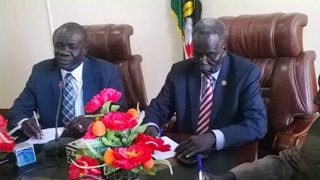W. Bahr el Ghazal cabinet briefed at peace talks
November 18, 2014 (WAU) – A member of the South Sudanese government delegation at the peace talks in Ethiopia on Tuesday briefed Western Bahr el Ghazal cabinet members on progress made.

“We agreed on many conditions with the rebels for the sake of peace to return to our country. The conditions were including the issue of interim government of national unity, prime creation of position of prime minister to the rebels and many others,” said Yak.
“Our agreement to give Riek [Machar] position of prime minister in the country does not grant him any executive powers,” he added.
The official further said government accepted to integrate rebel forces into the army, but said the white army would not be included.
“The government will only reconsider those who defected from it military base on the 15 December 2013 to go back to their military units, but those who joined from white army will not have room for the integration,” said Yak.
Also discussed at the talks was reportedly the issue of compensating those who lost properties during the nation’s nearly one year conflict.
“The issue of federalism was part of the agreement. We have recommended we first work on the interim government formation and it will be the decision from the large entire citizens of South Sudan to determine which type of governance they want during the three months formation of interim period,” said the official.
However, Yak said rebels demands for the removal of vice president, James Wani Igga was rejected by the government.
“We cannot solve a problem with a problem because removing Igga is another problem, which is unacceptable,” he said.
Last week, IGAD, which is mediating talks between South Sudan’s two warring parties, announced that progress was made in the power-sharing arrangements between the two principal leaders during the 28th extraordinary summit recently held by regional heads of state and government.
The two rivals reportedly agreed on how to share executive powers between the president and prime minister, including an agreement to command separate armies during initial phases of the would-be transitional period.
Mediators gave a15-day ultimatum for both sides to reach a consensus on the sticking points.
Observers, however, say a scrimmage for executive powers between the president and prime minister means it could be weeks, if not months, before a peace deal is struck.
Regional leaders have threatened both sides with sanctions if they fail to take steps to end the violence.
(ST)
